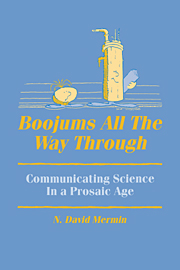Book contents
- Frontmatter
- Contents
- Preface
- I Reflections on the pursuit of physics
- 1 E pluribus boojum: The physicist as neologist
- 2 Commencement address, St. Johns College, Santa Fe, May 18, 1986
- 3 “One of the great physicists … and great characters”
- 4 My life with Landau
- 5 What's wrong with this Lagrangean?
- 6 What's wrong with this library?
- 7 What's wrong with this prose?
- 8 What's wrong with these equations?
- 9 What's wrong with these prizes?
- II The quantum theory
- III Relativity
- IV Mathematical musings
3 - “One of the great physicists … and great characters”
Published online by Cambridge University Press: 02 December 2009
- Frontmatter
- Contents
- Preface
- I Reflections on the pursuit of physics
- 1 E pluribus boojum: The physicist as neologist
- 2 Commencement address, St. Johns College, Santa Fe, May 18, 1986
- 3 “One of the great physicists … and great characters”
- 4 My life with Landau
- 5 What's wrong with this Lagrangean?
- 6 What's wrong with this library?
- 7 What's wrong with this prose?
- 8 What's wrong with these equations?
- 9 What's wrong with these prizes?
- II The quantum theory
- III Relativity
- IV Mathematical musings
Summary
Imagine a New Yorker profile in the literary style of Krokodil, and you have this book. Not a biography of Lev Davidovich Landau, it is an attempt to portray the human and scientific style of this extraordinary man and the remarkable school of theoretical physics he single-handedly created and sustained. Written for the edification of youth, it suffers from that turgid sentimentality – the rapture of an elephant in heat – that seems to accompany all Soviet efforts at morally elevating prose. It should nevertheless be fascinating reading for anyone working along the trails first blazed by Landau himself, that is, for almost all physicists.
After two introductions (why two? why not, I suppose, but this is typical of the literary anarchy that follows) Anna Livanova gives us a tantalizing glimpse of Landau before the age of sixteen, when he entered the university in Leningrad. Aside from a nod to his wife (an engineer in a chocolate factory; love at first sight; a son, Igor, in 1946) the rest is, so to speak, history, and the history is told (and this is the saving grace of the book) primarily through a wonderful series of anecdotes and vignettes.
There are two main sections: an evocation of the school of Landau as it operated under the Master, and an attempt to convey in nontechnical terms the nature of his contributions to the theory of superfluid helium. The former is the better part.
- Type
- Chapter
- Information
- Boojums All the Way throughCommunicating Science in a Prosaic Age, pp. 35 - 37Publisher: Cambridge University PressPrint publication year: 1990



